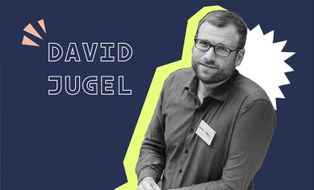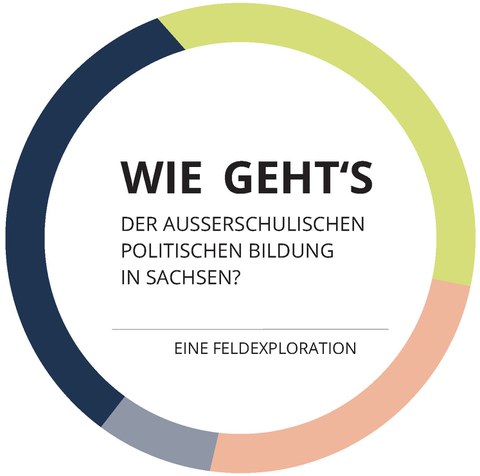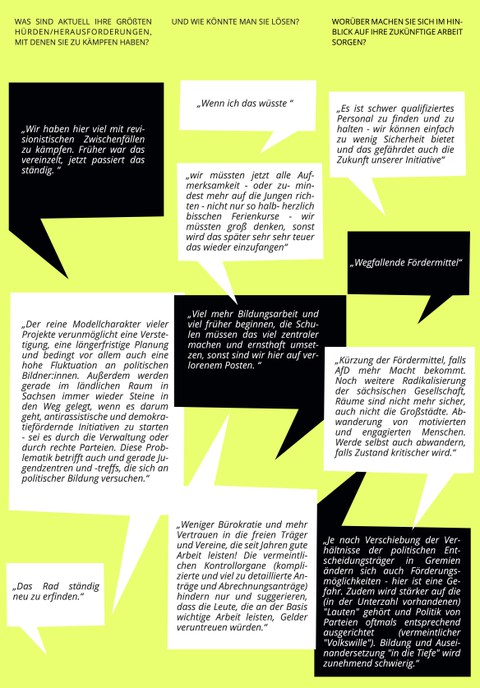HOW IS extracurricular political education going in Saxony?
© JoDDiD
The results of the study were presented to the public in a digital video conference on June 7 at 1:00 pm. All interested parties and representatives of the press were cordially invited to attend and were able to ask the authors questions and discuss the findings together. Thank you for your interest! You can download the study papers in more detail on the following page.
Download the study and the strategy paper.
Results
The aim of the John Dewey Research Center for the Didactics of Democracy (JoDDiD), newly founded at the TUD Dresden University of Technology at the beginning of 2021, is to strengthen extracurricular political youth and adult education in Saxony. In particular, the focus is on supporting existing educational offers and providers, providing them with high-quality training and being available as a contact point for innovative educational projects, for knowledge transfer between formal and non-formal education and for didactic advice on ongoing projects. In order to fulfill this mission, it was necessary to obtain sufficient information about the field of Saxon educators, their current challenges and wishes, as well as their biographical backgrounds and prerequisites. The results of an online survey conducted for this purpose with more than eighty employees of organizations that offer political education in Saxony are presented and discussed below.
Even though this survey is exploratory and not a representative study, the feedback from more than 80 people active in these areas of activity provides a valuable and meaningful impression and more than just approaches for further and in-depth discussion.
- Employees in extracurricular political education usually begin their work without didactic training and rarely with pedagogical training.
- The career paths of extracurricular civic educators are diverse and there are no "typical" professional biographies.
-
Extracurricular educators want didactic and pedagogical reflection, qualification and professionalization. They formulate specific needs.
-
Practitioners of extracurricular civic education have proven experience from civic education projects that have already been implemented. At the same time, there are indications that there is an increased need for systematization and classification of knowledge as well as a need for self-assurance of the effectiveness of their own work.
-
Employees in extracurricular civic education and their programs are sometimes exposed to massive attacks, disruptions and hostility.
-
The attacks not only lead to concerns about the political climate in Saxony, but also to changes in the way educators work.
-
Precarious working conditions and institutional constraints are described as major challenges in their professional work.
-
Employees in extracurricular civic education feel that their work is not valued enough and are sometimes frustrated.
-
The coronavirus pandemic poses an additional challenge for extracurricular civic education, resulting in further needs.
-
The school as a formal institution of civic education is an important, albeit ambivalent, point of reference for the interviewees. Both offers ("school as a cooperation partner") and explicit demarcation strategies ("school as a counter-institution") are oriented towards it.
-
Within the group of interviewees, political education is planned, conceived and implemented according to target group concepts. Other didactic concepts such as topicality, locations or content play less of a role.
Summary
This study on the first exploration of the field of extracurricular political educators in Saxony provides numerous indications of the constitution of the field, the existing challenges, needs and potential for development.
It was found that the interviewees have very diverse educational backgrounds and professional biographies. Although they have acquired extensive and relevant practical knowledge, they formulate concrete didactic qualification requirements. These include dealing with diverse target groups, but also the development of digital formats against the backdrop of the Covid-19 pandemic. The thesis that there is a need to develop reflective-theoretical skills and practice-relevant implementation skills must be further investigated using appropriate survey instruments. In this context, knowledge on the development of a common professional identity and its implications for practical action could also be deepened.
In addition, the challenges of the Saxon educational landscape could be outlined. Temporary project funding in particular appears to have numerous negative consequences. In addition to the individual pressure caused by precarious working conditions in sometimes atypical employment relationships, administrative tasks leave less time for the qualitative design of the offers. It is becoming increasingly difficult to find qualified staff for educational programs and a collective pressure to justify and succeed has developed. This seems to be one of the reasons why the interviewees make it clear in various places that they feel little valued for their work and are frustrated with their own working conditions. Above all, there is a need for political action to fund extracurricular political education work differently and on a more long-term basis.
The indications that the educators surveyed in Saxony are exposed to attacks in various forms and at the same time are very concerned about the political climate in the state seem worrying. The extent of the attacks ranges from disruptions and verbal attacks at individual events to physical attacks and personal death threats. Not only are appropriate support structures needed here, but also follow-up research in a targeted manner in order to examine the indications of the negative consequences for political education work indicated here in more detail. Due to the breadth of the study and some methodological pitfalls in the creation and formulation of the items (see introduction), the indicative findings must be understood as indications for more in-depth discussions and subsequent research work.
Although the present study is a pilot-type field exploration, the indications of an existing need for qualification, advice, recognition and security in the field of extracurricular civic education in Saxony are growing.
Media report on the field exploration
Download the study
- Field exploration: "HOW IS extracurricular political education doing in Saxony?"
- Policy advisory strategy paper: "WHAT TO DO in extracurricular civic education in Saxony"
- Set of slides with visualized study results: "SCHLAGLICHTER zur außerschulischen politischen Bildung in Sachsen"
- Press release from June 7, 2022 on the JoDDiD field exploration study
Appendix
- Anonymized data set
- Coding
- Assignment table T1: Degree program and category
- Overview of the questions asked
 © Nele Mai
© Nele Mai
Research Associate
NameRico Lewerenz
John-Dewey-Forschungsstelle für die Didaktik der Demokratie
Send encrypted email via the SecureMail portal (for TUD external users only).
Visiting address:
von-Gerber-Bau, Room 267 Bergstraße 53
01062 Dresden
Office hours:
z. Zt. nach persönlicher Vereinbarung
 © JoDDiD
© JoDDiD
Research Associate
NameDavid Jugel
John-Dewey-Forschungsstelle für die Didaktik der Demokratie
Send encrypted email via the SecureMail portal (for TUD external users only).
Büro:
ABS Haus 116, Room 015 August-Bebel-Straße 30
01219 Dresden
None
Office hours:
nach Vereinbarung


